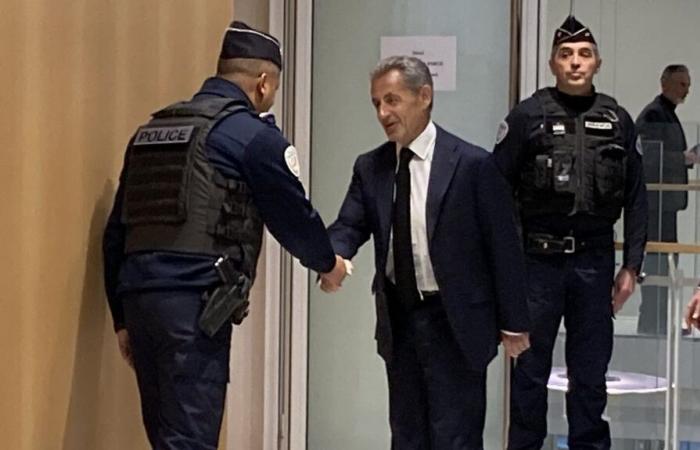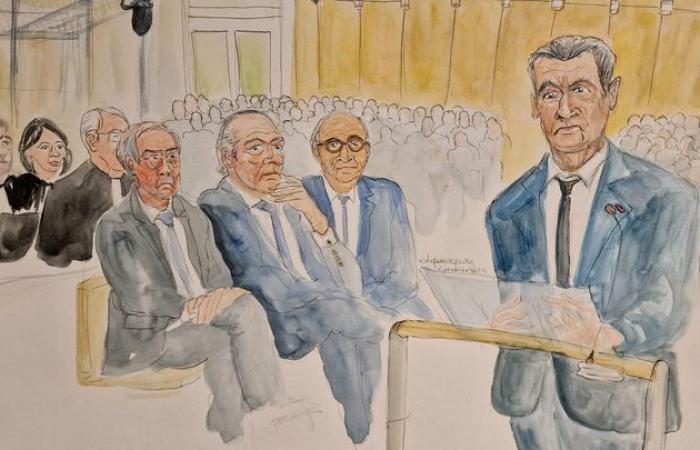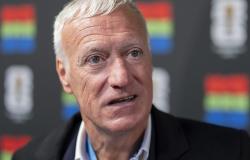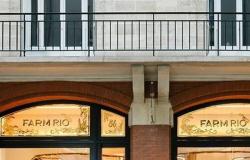Before entering the courtroom, he took care to shake the hands of the two police officers who held the door for him. Nicolas Sarkozy did not depart from his reflexes as a former Minister of the Interior at the opening of his trial in the case of suspicions of Libyan financing of his victorious presidential campaign. The one who presided over France from 2007 to 2012 appears from Monday 6 January before the Paris Criminal Court for having sealed, according to the prosecution, a “corruption pact” with the late Libyan dictator Muammar Gaddafi.
Among the twelve other people tried in this sprawling case of 73 volumes feature three former ministers : Claude Guéant, Brice Hortefeux and Eric Woerth. They are accused, to varying degrees, of having “organized” and received “fund transfers” from Libya, the total amount of which has not been established.
While they were prohibited from communicating since their placement under judicial control, Nicolas Sarkozy and these leaders of the French right, faithful among the faithful, exchanged a few words before sitting side by side, all four, on the bench defendants. A striking image, almost twenty years after the affair broke out in 2012.
One after the other, these men in dark suits and ties over white shirts, who have held the highest positions in the State, were called to the stand by the president, Nathalie Gavarino, to state their identity. Claude Guéant, who will be 80 years old on the 17th January, came forward first. The former secretary general of the Elysée, who became Nicolas Sarkozy's Minister of the Interior, is today “retirement” et “widower”. Brice Hortefeux, 67 years old, is also “retired from the civil service”after a long political career, including six years as minister, and “divorce”.

Nicolas Sarkozy, who will celebrate his 70th years old at the end of January, is still “lawyer” and always “married”. Nationality ? “Française”he confirms, after a joke about the Italian origins of his wife Carla Bruni. Eric Woerth, finally, former treasurer of the 2007 campaign, in turn talks about his married life and his current functions as deputy (Together for the Republic) of Oise. He will blow out his sixty-ninth candle at the end of January, during the trial.
Four other defendants took the stand, including the sulphurous intermediary Alexandre Djouhri, 66 years old, with a more relaxed style of clothing – suit-sneakers. His sworn enemy, Ziad Takieddine, the other intermediary in the case, is however absent. On the run in Lebanon, this businessman told RTL on Monday that he was available to French justice to testify by videoconference. And reiterated his accusations, after having retracted for a while : “[Nicolas] Sarkozy went to see [Mouammar] Gaddafi, he asked [son] argent (…). I can say that [Mouammar] Gaddafi paid him up to 50 million euros.”
Other defendants were also missing on Monday. Bechir Saleh, former financier of the Libyan regime, once exfiltrated in France, is the subject of an arrest warrant and will be represented during the four month of trial by two lawyers.
The Saudi billionaire Khaled Ali Bugshan, prosecuted in the section of the tables, relating to the alleged personal enrichment of Claude Guéant, is also the subject of an arrest warrant. As for the official buyer of the paintings, the Malaysian Sivajothi Rajendram, he “would have died”said the president. The termination of the proceedings against him should be made official during the debates.
Before looking at the defense's attempts to postpone the trial, the president solemnly recalled : “All persons charged are presumed innocent until proven guilty.” The court then rejected a priority question of constitutionality filed by Khaled Ali Bugshan's lawyer to challenge the accumulation of charges against his client.
He subsequently heard the lawyers' arguments on the jurisdiction of the Court of Justice of the Republic (CJR) to judge certain defendants, on the grounds that they were ministers in office at the time of the alleged events. And for good reason : the CJR is renowned for being more lenient in its decisions.
“Let me warn you : by declaring yourself competent, you will seriously undermine the spirit of our institutions and the separation of powers”thus launched one of Nicolas Sarkozy's counsel, Jean-Michel Darrois, into court. “Insinuating arguments according to which Nicolas Sarkozy is a victim of the judicial institution is not commensurate with either your career or your talent”retorted Quentin Dandoy, one of the three prosecutors of the National Financial Prosecutor's Office, setting the tone in this first battle.
And the magistrate recalled that when he met the dictator in his tent in Libya at the end of 2005, Nicolas Sarkozy was not in his role as Minister of the Interior, but rather in that of future candidate. “We are looking for personal interest : that of your presidential campaign”supports Quentin Dandoy. On his bench, the person concerned boils, grumbles, shrugs his shoulders. The former President of the Republic will still have to wait to deliver his version of the facts.







